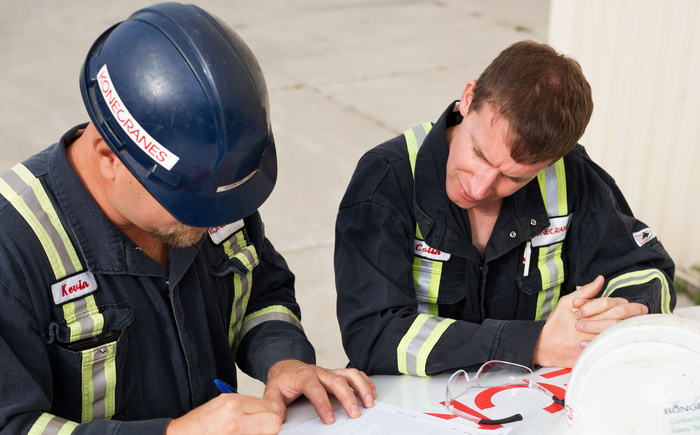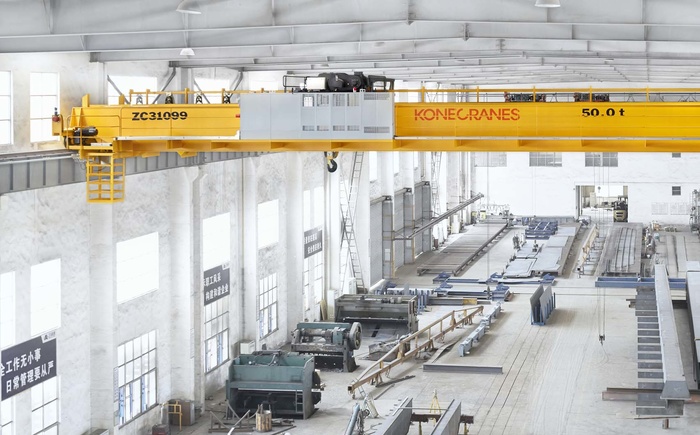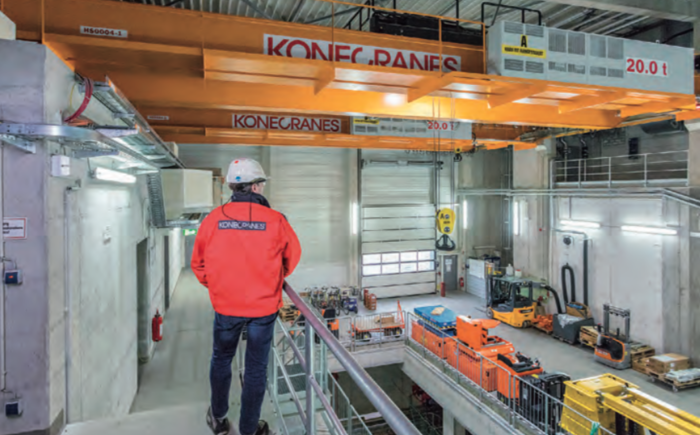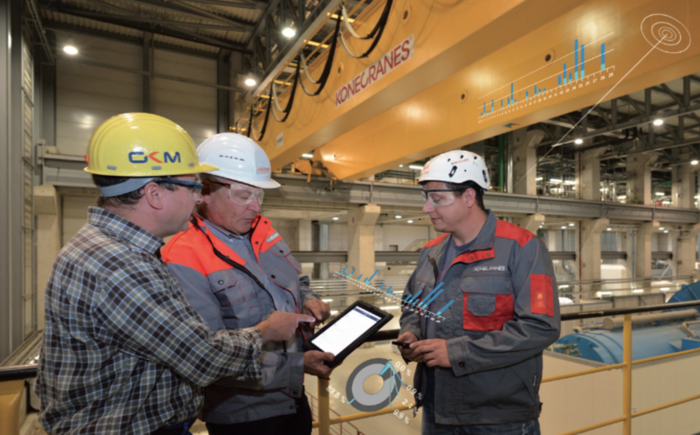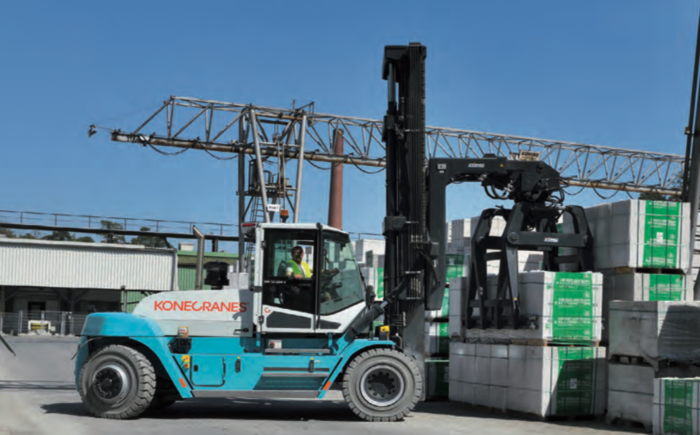Konecranes uses leading technology and trained specialists to offer a variety of consultation services that take a deeper look at your crane and its components.
Critical components
Undetected defects and/or deficiencies in loadbearing or safety-related components can lead to failure. Most compliance and preventive maintenance inspections rely on visual observations and measurements. Unfortunately, what you can’t see can hurt you. Certain defects and deficiencies cannot be seen with the naked eye; others may occur within components that are not normally disassembled for inspection.
Gear case inspection
Cranes that have been used heavily, or that have been in service for many years, can develop cumulative fatigue and other adverse characteristics. In extreme conditions, a gear case might fail catastrophically, resulting in a load drop. For compliance and safety we recommend a Gear Case Inspection to determine the condition of your overhead crane gears and related components.
Advanced gear case inspection
The Advanced Gear Case Inspection is recommended for equipment more than 10 years old, high duty and cycle applications, gears with thin rim or welded spoke design, equipment being used beyond its original design, process critical cranes and equipment with an unknown history. This inspection can reveal faint or small deficiencies that cannot be seen with the unassisted eye, yet may result in future issues if left unresolved.
Coupling inspection
The mechanical coupling between the hoist motor and the hoisting gear case is another critical component for the safe operation of lifting equipment. Failure of a hoist coupling may lead to load drop.
The coupling is taken apart and cleaned of old grease. The surfaces are then visually inspected. After inspection, non-destructive testing may need to be performed.
Hook/shank inspection
Non-destructive testing is available to uncover latent defects in the hook and shank.
We utilize various proven non-destructive testing techniques such as dye penetrant, magnetic particle and magnetic rubber, in addition to the visual inspection and measurements normally performed during a hook inspection.
Below-the-hook inspection
This inspection has been designed to inspect the removable devices attached to your crane hook during operation. The inspection identifies deficiencies and deviations from local regulations.
Inspected devices may include:
- Accessories such as chain alloy, wire rope slings, metal mesh, natural or synthetic fiber rope, or synthetic web
- Production lifting devices, such as spreader beams, coil hooks, sheet lifters, vacuum lifters or magnets
- Customer lifting devices such as balancers or custom-built maintenance accessories
RopeQ magnetic rope inspection
During a typical inspection, only the outer wires and strands of the wire rope can be visually inspected. Konecranes RopeQ™ technology and non-destructive testing methodology analyzes the condition of the internal wires, strands and wire rope core that are not typically visible.
Crane reliability study
The Crane Reliability Study (CRS) is an engineering assessment that studies the current condition of your crane and provides a theoretical estimate of its remaining design life. The study looks at structures, mechanical components and electrical systems, and highlights possible maintenance and modernization needs.
Geometrics
Konecranes RailQ™ Runway Survey and CraneQ ™ Crane Geometric Survey work together for a complete View of crane and rail geometry.
RailQ Runway Survey
Cranes should travel or track along their runway rails with a minimum of skew and without binding. Improper tracking leads to premature wheel and rail wear, resulting in costly repairs and downtime, as well as inefficient and suboptimal crane operation.
RailQ is an industry-leading rail analysis. It delivers accurate alignment information of your rail and expert recommendations for corrective action.
CraneQ Crane Geometric Survey
With CraneQ, we verify the crane for squareness, meaning the end trucks must be parallel to each other and perpendicular to the bridge girder for the crane to track properly. In addition, the geometry of the end trucks themselves is verified, as is the alignment of the wheels within the end trucks. Finally, the girders for the crane are measured for camber.
CraneQ is based on advanced and traditional measurement methods. Proprietary software and skilled survey technicians provide an extremely accurate geometric analysis of your crane.
Analysis products
We offer a variety of analysis products that take a look at the design life, streel structure, rope and hook.
Design Life Analysis
Frequent inspections, while necessary, cannot always catch machinery failure that may be caused by extremely fast crack propagation. A calculation of design life will give information that helps you assess your safe working limits and plan actions for continued equipment use.
The Design Life Analysis calculates the remaining design life of the structures and machineries of your crane.
Steel Structure Analysis
The steel structures of your crane shoulder the weight of your lifting operations. Those structures are subjected to fatigue as loads are lifted, and as fatigue life ends, safety can be compromised.
The Steel Structure Analysis can give you an accurate, detailed picture of the remaining fatigue life of the steel structure of your crane and help identify defects.
Rope Analysis
The Rope Analysis is designed to provide expert consultation to answer your wire-rope- and rope-reeving questions. The analysis targets individual concerns such as rope selection, rope life, component failures, unexpected rope behavior, accident investigation or improvement opportunities, including recommendations on extending rope and component life.
Hook Analysis
The crane hook and bottom block components are stressed during each hoisting cycle. Hooks can fail due to cumulative fatigue. These failures often start as a fatigue crack in the hook shank. Heavy process-duty applications, changes in application and the use of below-the-hook lifting devices can all contribute to cumulative fatigue.
The Hook Analysis utilizes visual and NDT inspections combined with fatigue calculations of the hook/shank and critical components of the bottom block.
Crane Operator Training
Crane Operator Training is designed for crane operators and the supervisory personnel responsible for the daily operation and safe performance of cranes. The training gives participants the working knowledge to assist in reducing operator errors that may lead to unnecessary downtime. Crane operator training can provide additional knowledge to help avoid possible serious injury to personnel caused by improper crane operation.
